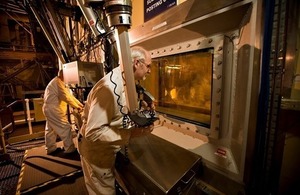Liquid waste made safe
Work has started to make one of the most hazardous materials left at Dounreay safer.

A project is underway to reduce the risk by filling more than 30 drums with 15,000 litres of solid waste
Highly radioactive liquid, known as raffinate, has been stored in tanks for around 20 years after being produced as a by-product of Prototype Fast Reactor (PFR) fuel reprocessing.
A project is underway to reduce the risk by filling more than 30 drums with 15,000 litres of solid waste as part of an initial commissioning process.
Project Manager, Stuart Andrew, explained:
One of the reasons that this material is so hazardous is because it is in a mobile, liquid form.
We are taking an exact amount of liquid waste from each tank to create a consistent blend. It is then mixed with cement, pulverised fuel ash and lime powders to create a stable solid waste package.
Waste Director Sam Usher added:
This is probably our highest single remaining hazard at Dounreay. Safely and compliantly creating the first solid waste drums is a huge achievement for the team and a major step forward as we deal with the site’s legacy hazards.
It has taken almost 2 years to modify the plant and equipment which was previously used to process more than 230m³ of Dounreay Fast Reactor raffinate.
Up to 100 drums are expected to be produced in the next few months, as part of the first phase of this programme, with all PFR raffinate expected to have been processed within the next 5 years.
Mark Raffle, Lead Programme Manager from the Nuclear Decommissioning Authority, said:
Immobilisation of this highly radioactive liquid will be a significant step towards reducing the remaining hazards at Dounreay.
Completion of this work will enable decommissioning of the major facility where the material is currently stored, moving the site closer towards its interim end state.
Suppliers are being asked to express their interest in a contract to construct an extension to the facility where the waste packages will be stored - in accordance with the Scottish Government’s higher activity radioactive waste policy. The multi-million pound project is expected to begin later this year.